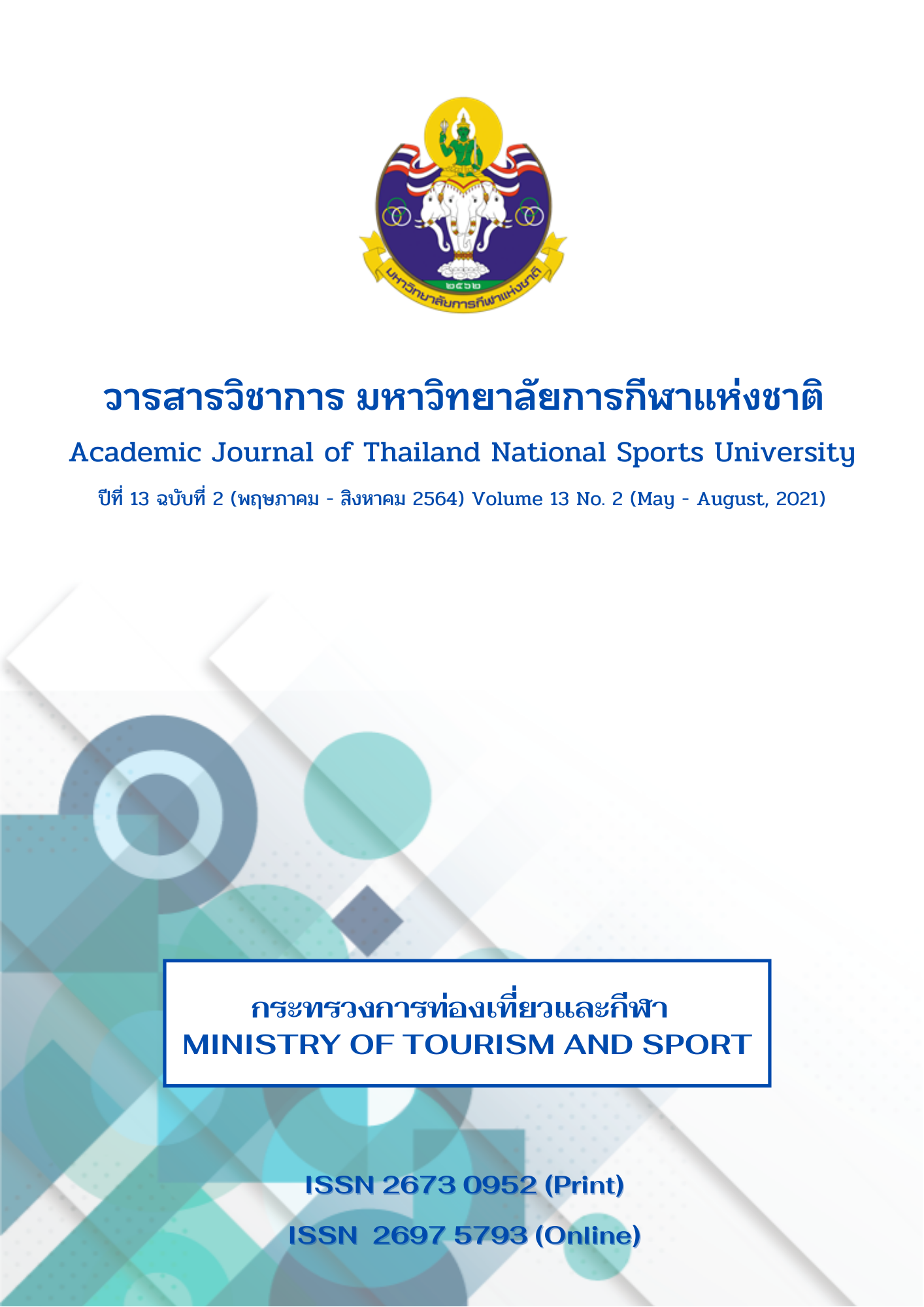INTEGRATED MODEL OF KNOWLEDGE MANAGEMENT AND PROFESSIONAL LEARNING COMMUNITY FOR DEVELOPING COACHES IN SPORT SCHOOLS
Main Article Content
Abstract
The objective of the research is to create the integrated model of knowledge management (KM) and professional learning community (PLC) for developing coaches in sport schools by using in depth interview with 9 experts to determine the model. The use of the model was confirmed by 6 experts.
The results of research revealed that the integrated model of knowledge management (KM) and professional learning community (PLC) for developing coaches in sport schools consists of 4 factors (PIER Model). There are: 1) plan 2) implement 3) evaluate and 4) reflect, in each of 5 factors composes with 5 processes: 1) grouping of 4-8 coaches: dominate the committees, establish the vision, mission and objectives 2) identify the problem and the needs: identify problems and the need to be developed and then prioritize them 3) design activities to solving problems: Coaches jointly design activities to solve problems 4) implementing and evaluating: coaches experiment and evaluate the activities and 5) reflexing: Coaches jointly criticize, discuss, conclude and evaluate. The result after action review, there was KM integrated in every process which consists of 3 steps: 1) knowledge acquisition 2) knowledge organization and 3) knowledge sharing.
Article Details
The published article is a copyright of the Academic Journal of Thailand National Sports University. The passage appeared in each article in this academic journal is a perspective of each author which is not related to the journal. Each author is required to be responsible for all components of his/her own article. If there are any mistakes, each author must be responsible for those mistakes on his/her own.
References
Chuchat Phuangsomchit. (2015). Professional Learning Community. Lecture documents at the college. Phang-nga community, Phang-nga province on December 28, 2015. Bangkok; (n.p).
Institute of Physical Education. (2017). Strategy Institute of Physical Education 2018-2022. Retrieved from www.http://ipe.ac.th
Ministry of Tourism and Sports. (2017). National Sport Development Plan No.6 (2017-2021). Bangkok: Office of the War Veterans Organization.
Nantanat Nantaphong. (2018). Professional Learning Community: PLC. Documentation for student experience coaching. Retrieved from http://www.yupparaj.ac.th/yrc/index.php/news/view/1025
Ofifice of Chumphon Primary Educational Service Area 1. (2016). Management guidelines for educational quality development. Document for workshop. Hansa JB Hotel, Hat Yai.
Office of Secondary Educational Service Area 17. (2017). Guidelines for PLC to learner quality development Thailand 4.0. Bangkok: Office.
Ofifice of Tak Primary Educational Service Area 1. (2017). Process PLC plan. Retrieved from http://www.takesa1.go.th/main56/note/pdf/PLCAnubanTAK2.pdf
Office of the Basic Education Commission. (2018). Performance manual for PLC process training. Retrieved from http://www.secondary5.go.th/main/?q=download/file/fid/9217
Office of the Education Council. (2017). National Education Plan 2017-2036. Bangkok: Prikwan Graphic Company. Office of the Education Council.
Stoll, L. & Louis, K.S. (2007). Professional Learning Community. New York, Open University Press.
Suraphon Thamromdee et al. (2010). Hermitage Art Research: Research and Development of Contemplative Learning Community. Academic Learning Project for Change No.8, Nakhonpathom: Amy Enterprise.
Vescio, V., Ross, D. & Adams, A. (2008). A review of research on the impact of professional learning communities on teaching practice and student learning. Teaching and Teacher Education, 24, 80–91.
Vicharn Panich. (2012). Learning Creativity for Learner in 21st Century. Bangkok: Tathata Publication Co.Ltd.
Vicharn Panich. (2013). How to teach in the 21st century. Retrieved from http://elc.psu.ac.th/elcpsu_2012/phocadownload/ppt_seminar/130325_teach_in_21/130325_teach_in_21.pdf


